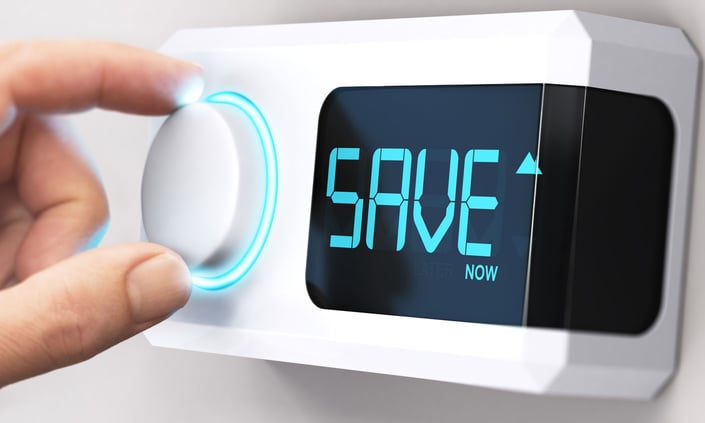Winter is here and with it comes colder temperatures. Depending on where you live, you may need to heat your home or apartment. Heating a house or apartment can be expensive because energy bills may go up significantly during the colder months. But, there is good news, there are several simple steps that can be taken to keep your winter energy bill from skyrocketing. 
With less sunlight you may need to keep the lights on longer. Not only might you use more electricity in the winter to keep your lights on, but you may also incur additional energy expenses for gas appliances like your furnace and water heater. According to the U.S. Department of Energy, the typical family spends an average of $2,200 per year on utilities, with nearly half of that for heating and cooling.
The U.S. Department of Energy also reports, you may be able to lower your utility bill up to 25% by making small tweaks to the usage of your utilities. Keep reading for tips to reduce your energy costs, increase your monthly utility savings, and maintain comfortable temperatures in your home this winter.
- Use the sun for free heat.
Utilize the natural energy and heat from the sun to help with temperature control in your residence throughout the year. During the winter months, open the curtains on the south-facing windows to bring sunshine (free heat) into your residence. Close the window coverings when the sun goes down to help keep the heat inside. - Bundle up.
This is one of the easiest ways to save on your heating bill. Instead of turning the thermostat up, wear a sweater and warm socks. Keep throw blankets on your couches and chairs and place an area rug in your favorite rooms to help insulate the floor. - Run your ceiling fans (if you have them) on low in a clockwise direction.
Standing beneath a ceiling fan in your home, make sure the blades are turning slowly in a clockwise direction during the winter months. This can be done by flipping a switch located on your ceiling fan, typically below the fan blades.
Running your ceiling fan on the lowest setting in a clockwise direction during the winter months forces the hot air that collects near the top of the room to slowly be pushed downward along the walls of the room. This creates a very gentle circulation that will warm the air near the bottom of the room. The air created by the ceiling fan moves so slow that you don't feel any breeze, reducing any chilling effect. This could help warm your room.
- Switch to LED bulbs.
As your conventional light bulbs stop working, replace them with LED alternatives. Making this switch can result in significant savings. Energy Star rated LED bulbs use at least 75% less energy and last up to 25 times longer than the conventional incandescent bulbs.[1] Beware, they are more expensive, but if you switch to LED's as incandescent bulbs blow out, coupled with the cost savings in electricity and the life of the LED bulb, you will likely save money in the long term. - Adjust the water temperature of your water heater.
Hot water can be a big user of energy. Depending on your water heater, it could be accounting for up to 18%[2] of your total utility bill. The U.S. Department of Energy recommends keeping the thermostat of your water heater set to 120°F. Any setting over 120°F is considered unnecessary and a potential waste of energy. Every 10° reduction in temperature may reduce 3% to 5% off your utility bill. - Fill drafty gaps.
Check the exterior walls, doors, and windows of your residence and find places where you can feel cold air coming into your home. These drafty gaps should be sealed. Doors and windows can typically be sealed with a foam weather seal, there are also weather strips you can attach to the bottom of the doors if there is a draft.
If you feel a draft at an electrical socket, you can either install a new cover on that socket or caulk around the edge. You can also install an attic stair cover to keep from leaking heat into your attic. You should check with your landlord if you’re renting and if you own your home, consult with an expert prior to tackling this type of project yourself.

- Set your thermostat.
If you haven’t upgraded to a programmable or smart thermostat yet, consider changing it out before this winter. These devices can be set to automatically lower the heat when you’re asleep or away from home. According to Energy Star, you can save as much as $180 every year in energy costs by using and properly setting a programmable thermostat. For optimal efficiency, set the temperature to 68°F or lower when you’re home and awake, and set it back to 60°F all other times. - Only heat the rooms you use.
If you have rooms that you never or rarely use, consider closing and sealing the vents. This will be more energy efficient by directing the flow of air into the other rooms of your residence that you use most often. - Change furnace filters.
Replace your furnace filters at least once a quarter, if not more often, depending on the type of filter you buy and how often the furnace runs. You can refer to your specific furnace manual to learn the replacement schedule, type of filter for your specific furnace, and the proper removal and installation method. - Close the fireplace damper.
If you have a vented fireplace by all means enjoy it this winter. But when it is not in use, remember to keep the damper closed because having the damper open when the fireplace is not being used can create a large hot air leak. An open damper creates a draft and pulls any heated air from the room and out of the house. - Set up budget billing.
If you've ever had your budget busted by a larger-than-normal utility bill, then you may want to consider budget billing. Budget billing means your utility company (like the power or gas company) will offer you a set amount due each month for a certain utility. To determine this amount, the company will add up the amount you spent last year on that particular utility, then divide that number by 12, assuming that your usage will generally stay the same. Budget billing might translate to higher bills in the summer months than what you’re used to because the total costs are spread equally across 12 months. This means that your winter bills will likely be lower than what you’re used to for the same reason. Budget billing can be a predictable way to manage your heating and cooling bills. Be mindful, that if you exceed the power you already paid for, the utility company will generally use December as a catch up month and you will need to set aside extra funds in case that happens.
Follow these energy saving tips and you too could be reducing your utility bills and saving money this winter.
For more money saving tips check out https://www.bigpictureloans.com/blog/best-money-saving-tips-going-green.
[1] https://www.energy.gov/energysaver/save-electricity-and-fuel/lighting-choices-save-you-money/led-lighting
[2] https://www.energy.gov/sites/prod/files/2014/09/f18/61628_BK_EERE-EnergySavers_w150.pdf







.png?width=144&height=134&name=2019_PCI_Logo_Footer_10_16_19%20(002).png)
